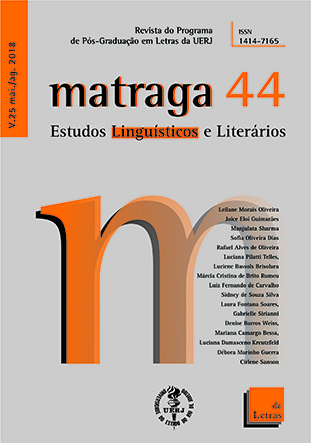A instrução explícita e seus efeitos na produção e na percepção das fricativas anteriores do português brasileiro/L2 por hispanofalantes latino-americanos/L1
DOI:
https://doi.org/10.12957/matraga.2018.33838Palavras-chave:
Português como Língua Estrangeira. Hispanofalantes. Instrução Explícita. Fricativas AnterioresResumo
No português, as fricativas anteriores surdas e sonoras constituem-se como fonemas e ocupam posição de contraste (CAMARA JR, 1977). No espanhol, enquanto as fricativas surdas constituem-se como fonemas, as sonoras só aparecem na língua como alofones posicionais ou por assimilação de vozeamento (HUALDE, 2014). Este artigo tem como objetivo analisar as estratégias de pronúncia e investigar os efeitos da instrução fonética explícita na produção e na percepção das fricativas anteriores sonoras por hispanofalantes latino-americanos aprendizes do português brasileiro. Os resultados, analisados com base nas teorias de percepção da fala em L2 (FLEGE, 1995; BEST, 1995; BEST; TYLER, 2007) e nas teorias dinamicistas sobre o desenvolvimento de L2 (LARSEN-FREEMAN, 1997; VERSPOOR, LOWIE, DE BOT, 2007), indicam, dentre outros aspectos, que a instrução explícita é uma ferramenta indispensável para o ensino da pronúncia em salas de Português como Língua Estrangeira.
Downloads
Downloads
Publicado
Como Citar
Edição
Seção
Licença
AUTORIZAÇÃO
A Matraga – Revista do Programa de Pós-Graduação em Letras da UERJ está autorizada a publicar o artigo ora submetido, caso seja aceito para publicação online. Fica atestado que a contribuição é original, que não está sendo submetida a outro editor para publicação, e que a presente declaração é a expressão da verdade.
Os trabalhos publicados no espaço virtual da Matraga – Revista do Programa de Pós-Graduação em Letras da UERJ serão automaticamente cedidos, ficando os seus direitos autorais reservados à Matraga. Sua reprodução, total ou parcial, é condicionada à citação dos autores e dos dados da publicação.

A Matraga utiliza uma Licença Creative Commons - Atribuição-NãoComercial 4.0 Internacional.





